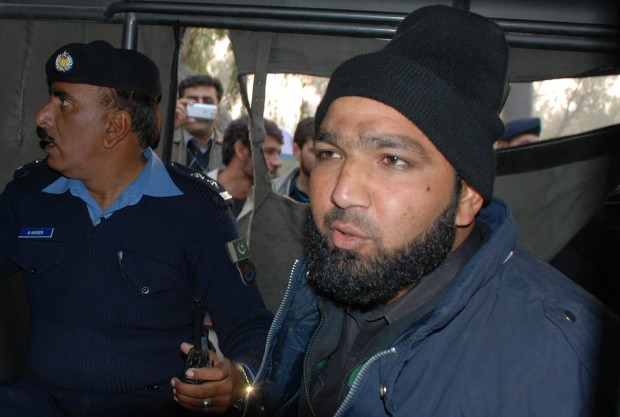A way for change in blasphemy law of Pakistan

In this Tuesday, Jan. 4, 2011 file photo, commander of Pakistan’s Elite force Mumtaz Qadri, right, who allegedly killed Punjab’s governor Salman Taseer sits in police custody in Islamabad, Pakistan. Pakistan’s Supreme Court on Wednesday, Oct. 7, 2015 has upheld the death sentence for a former police officer convicted of killing a provincial governor he had accused of blasphemy. Qadri shot and killed Governor Salman Taseer in 2011 in Islamabad days after Taseer defended a Christian woman accused of desecrating a Qur’an. (AP Photo/Irfan Ali, File)
The Supreme Court in Pakistan on Tuesday urged the state to ensure that no one is forced to endure an investigation or trial on the basis of false blasphemy allegations.
The court also rejected the appeal against death sentence of Mumtaz Qadri, who has received death sentence for killing the then Punjab governor Salmaan Taseer on January 4, 2011 over blasphemy allegations. Qadri assassinated Taseer after he spoke out against the abuse of blasphemy law in Pakistan.
Authoring the 39-page verdict on Tuesday, Justice Khosa said Qadri had murdered Taseer on the basis of nothing but hearsay. “It is an unfortunate fact which cannot be disputed that in many cases registered in respect of the offence of blasphemy, false allegations are levelled for extraneous purposes.” He said that in the absence of adequate safeguards against abuse of the blasphemy law, people falsely accused of the offence suffer irrevocably.
The order said any call for reform in religion-related laws should be seen as a call for introducing safeguards against abuse of such laws, adding that it should not be interpreted as a call against the religious aspects of the offences covered by the laws.
The verdict read if the asserted religious motivation of Qadri is to be accepted as a valid circumstance in this case, then it will pave the way for religious vigilantism which will be “a mortal blow to the rule of law in this country”.
Qadri’s claim was diluted by the fact that he claimed the former governor used to indulge in ‘immoral activities’, thus he had personal hatred for Taseer, which too had played some part in triggering Qadri into action.
The order said Qadri wanted to send a message or teach a lesson to everyone who dared to follow Taseer’s suit. “We have entertained no manner of doubt that the action of the appellant and the intention, design or purpose behind such action fully attracted the definition of terrorism … and, therefore, he was correctly and justifiably punished by the trial court … for committing the offence of terrorism.”
As the court seems to be welcoming to suitable amendment in the blasphemy law to avoid investigations for false allegations, which constitute most of the blasphemy cases in Pakistan, as people abuse the law to their advantage, falsely accusing others to gain personal benefits, there appears a ray of hope for people, most of whom belong to minority groups in Pakistan, who get falsely reprimanded for blasphemy.




















































